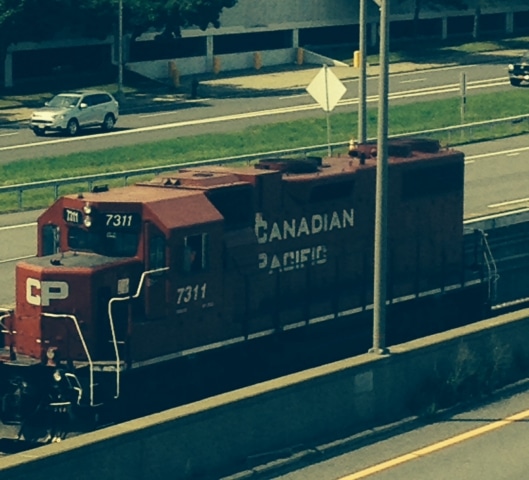Earlier this month Hunter Harrison, the CEO of Canadian Pacific told the Globe and Mail that he thought regulators have “overreacted” to the oil-by-rail disaster in Lac-Megantic that killed 47 people.
“Lac-Mégantic happened, in my view, because of one person’s behaviour, if I read the file right,” Harrison said.
As detailed by DeSmogBlog, he didn’t read the file right. The accident was directly related to lack of regulation and the railroads putting profits before safety.
Harrison’s choice of words echoed those of American Petroleum Institute CEO Jack Gerard commenting on the new proposed oil-by-rail regulations when he stated: “Overreacting creates more challenges than safety.”
Yea, that’s right, according to Big Oil and Big Rail, the biggest threat to the 25 million people living in the bomb train blast zones is the overreaction of regulators.
The rail industry is now spending a lot of time pushing back on the new regulations on train speed. As anyone with a basic understanding of physics knows, the speed of the train is a critical factor in the severity of any accident.
Gregory Saxton, chief engineer for rail tank manufacturer Greenbriar, made that clear at a National Transportation Safety Board conference on oil-by-rail safety in April.
“Kinetic energy is related to the square of velocity. So if you double the speed, you have four times as much energy to deal with,” argued Saxton. “Speed is a big deal.”
Speed is also a big deal when it comes to profits. Canadian Pacific’s Harrison recently explained to the Wall Street Journal that his main focus on improving profits was on increasing train speeds, “This next stage of growth is driven by a lot of things, a little bit here, a little bit there, but it’s effectively all the things that impact train speed and train velocity.”
And just as Harrison has arrived at his own incorrect conclusion about Lac-Megantic, he has once again ignored the facts when it comes to the relationship of speed to rail safety. DeSmogBlog reported Harrison’s comments earlier this year on a conference call talking to investors about rail safety.
“I don’t know of any incidents with crude that’s being caused by speed. We keep slowing down in this North American network over the years. We don’t get better with speed. We get worse.”
Putting the Brakes on Train Regulations
And the rail industry isn’t only arguing against speed limits in its pursuit of profit. It is also arguing against modernizing the braking systems for the oil trains. As previously reported on DeSmogBlog, many of the oil trains being operated are using air brakes described as 19th century technology.
The rail industry is lobbying to avoid having to upgrade the braking systems to the latest technology known as electronically controlled pneumatic brakes (ECP) claiming that the benefits of this new braking don’t justify the costs. The American Association of Railroads (AAR) submitted comments to regulators urging them to, “Refrain from requiring electronically controlled pneumatic brakes on tank cars used to move flammable liquids, as they are very costly systems not justified in terms of improved safety benefits”
Meanwhile, a report submitted by the Pipeline and Hazardous Materials Safety Administration as part of the documents for the new rulemaking process clearly defines the safety benefits of ECP braking compared to the existing and other proposed options.
The effectiveness rate of the ECP brake system (36 percent) was based on a model developed to predict the number of cars that will puncture when involved in a derailment. The effectiveness rate of the DP and DP (2/3) was estimated (18 percent) based on energy dissipation trend lines of trains equipped with these systems relative to the ECP brake system trend line.
So ECP braking systems are twice as effective as the next best option. Time will tell if regulators agree with rail lobbyists that this clear increase in safety is worth cutting into industry profits.
Rail Industry Asks for Applause (Seriously)
In a press release last week, American Association of Railroads president Edward Hamberger expressed his concern about the regulators’ overreactions and explained how he thought the best approach for regulators is to step back and applaud the industry for all they do.
“Instead of hampering the rail industry’s ability to grow the nation’s rail network and expand capacity due to the changes brought on by a growing economy, lawmakers and regulators should be applauding the industry’s can-do attitude and commitment. Tying the industry’s hand behind its back is not going to resolve the challenges shippers and rail alike are facing,” Hamberger said.
This week Canadian Pacific reported that its third-quarter profits were up 26 percent. CP’s stock price has now increased 50 percent in the last 12 months. The question now facing regulators is how many known safety measures will they sacrifice so that Canadian Pacific and the rest of the rail industry can continue going full speed ahead in their quest for ever greater profits — and applause.
Subscribe to our newsletter
Stay up to date with DeSmog news and alerts







